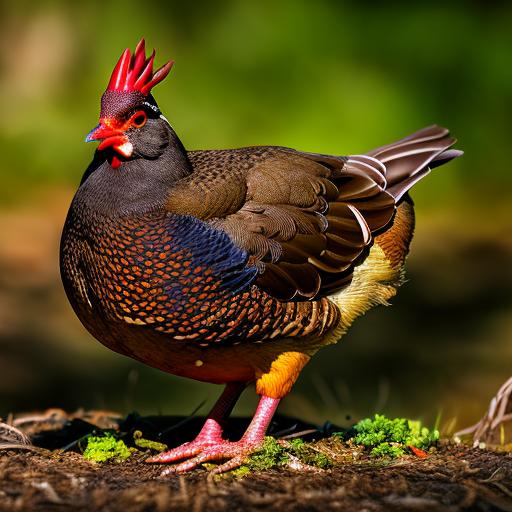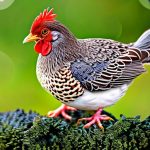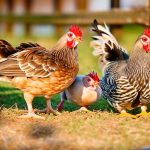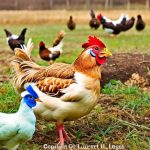Cornish Game Hens and chickens are both popular poultry birds that are often kept for their meat and eggs. Cornish Game Hens, also known as Cornish Cross, are a hybrid breed of chicken that is specifically bred for meat production. They are smaller in size compared to regular chickens and have a higher meat-to-bone ratio. On the other hand, chickens, which come in various breeds, are typically kept for both meat and egg production.
Keeping both Cornish Game Hens and chickens together can be beneficial for poultry enthusiasts who want to have a diverse flock. It allows for a variety of meat and egg options, as well as the opportunity to observe the different behaviors and characteristics of these two types of birds. However, it is important to consider certain factors to ensure a harmonious coexistence between the two.
Key Takeaways
- Cornish Game Hens and chickens are two different types of birds that can be kept together.
- A chicken coop is essential for providing a safe and comfortable living space for both birds.
- Cornish Game Hens require less space than chickens, but both need adequate room to move around.
- Providing a balanced diet is important for the health and well-being of both birds.
- Understanding the social dynamics and behavior of both birds can help prevent conflicts and promote a harmonious living environment.
Compatibility: Can Cornish Game Hens and Chickens Coexist?
When introducing Cornish Game Hens to a flock of chickens, there are several factors to consider to ensure compatibility. Firstly, it is important to introduce the new birds gradually and monitor their interactions closely. Chickens can be territorial and may initially view the Cornish Game Hens as intruders. By allowing them to get used to each other’s presence through a gradual introduction process, you can minimize any potential conflicts.
Another factor to consider is the size difference between Cornish Game Hens and chickens. Cornish Game Hens are smaller in size and may be more vulnerable to aggression from larger chickens. It is important to provide enough space for both types of birds to move around comfortably and establish their own territories. This can help reduce any potential aggression or bullying.
Housing: The Importance of a Chicken Coop
Having a suitable housing setup is crucial for both Cornish Game Hens and chickens. A chicken coop provides protection from predators, shelter from the elements, and a safe space for the birds to roost and lay eggs. When keeping both types of birds together, it is important to ensure that the coop is large enough to accommodate them comfortably.
When building or buying a coop, consider the number of birds you plan to keep and provide enough space for each bird. Cornish Game Hens require less space compared to chickens, but it is still important to provide enough room for them to move around freely. Additionally, make sure the coop has separate nesting boxes for each bird to lay their eggs.
Size: How Much Space Do Cornish Game Hens and Chickens Need?
Both Cornish Game Hens and chickens require adequate space to live comfortably. The recommended space requirements for Cornish Game Hens are around 1 square foot per bird in the coop and 10 square feet per bird in an outdoor run. For chickens, the recommended space requirements are around 2-3 square feet per bird in the coop and 10 square feet per bird in an outdoor run.
To ensure that both birds have enough space, consider the size of your flock and provide a larger coop and run if necessary. It is important to avoid overcrowding, as this can lead to stress, aggression, and health issues. Providing ample space allows the birds to move around freely, exercise, and establish their own territories.
Feeding: Meeting the Nutritional Needs of Both Birds
Cornish Game Hens and chickens have different nutritional needs due to their different purposes. Cornish Game Hens are primarily bred for meat production and require a high-protein diet to support their rapid growth. They should be fed a diet that consists of around 20-22% protein.
Chickens, on the other hand, require a balanced diet that includes both protein and carbohydrates. They need a diet that consists of around 16-18% protein. Additionally, chickens require calcium for egg production, so it is important to provide them with a source of calcium such as crushed oyster shells or eggshells.
When keeping both types of birds together, it is important to provide a balanced diet that meets the nutritional needs of both. This can be achieved by feeding a commercial poultry feed that is suitable for both Cornish Game Hens and chickens. Additionally, providing fresh fruits and vegetables as treats can help supplement their diet and provide additional nutrients.
Behavior: Understanding the Social Dynamics of Cornish Game Hens and Chickens

Cornish Game Hens and chickens have different social dynamics and behaviors. Chickens are highly social animals that establish a pecking order within their flock. They may display aggressive behaviors such as pecking or chasing to establish dominance. Cornish Game Hens, on the other hand, are generally more docile and less aggressive.
When keeping both types of birds together, it is important to monitor their interactions closely and manage any aggressive behavior. Providing enough space for each bird to establish their own territory can help reduce aggression. Additionally, providing multiple sources of food and water can help minimize competition and reduce the likelihood of aggression.
Health: Maintaining the Wellness of Both Birds
Both Cornish Game Hens and chickens are susceptible to certain health issues that can affect their overall well-being. Common health issues in poultry include respiratory infections, parasites, and nutritional deficiencies. It is important to take preventive measures to maintain the health of both types of birds.
To prevent respiratory infections, ensure good ventilation in the coop and avoid overcrowding. Regularly clean the coop and provide clean bedding to minimize the risk of parasites. Additionally, provide a balanced diet that meets the nutritional needs of both birds to prevent nutritional deficiencies.
If any health issues arise, it is important to consult a veterinarian who specializes in poultry to diagnose and treat the problem effectively. Regular health checks and vaccinations can also help prevent the spread of diseases within the flock.
Egg Production: What to Expect from Cornish Game Hens and Chickens
Cornish Game Hens are not typically kept for egg production, as they are primarily bred for meat. They do lay eggs, but their egg production is not as high as that of chickens. On the other hand, chickens are known for their egg-laying capabilities and can produce a consistent supply of eggs.
If you are keeping both Cornish Game Hens and chickens together, it is important to manage your expectations regarding egg production. While chickens can provide a steady supply of eggs, the Cornish Game Hens may not contribute significantly to the egg production.
Coop Design: Tips for Creating a Safe and Comfortable Living Space
When designing a coop that can accommodate both Cornish Game Hens and chickens, there are several features to consider. Firstly, provide enough roosting space for both types of birds. Cornish Game Hens prefer lower roosts, while chickens prefer higher roosts. Providing multiple roosting options can help accommodate their preferences.
Additionally, provide separate nesting boxes for each bird to lay their eggs. Cornish Game Hens may require smaller nesting boxes compared to chickens due to their smaller size. Providing enough nesting boxes can help prevent competition and ensure that each bird has a comfortable space to lay their eggs.
Weighing the Pros and Cons of Keeping Cornish Game Hens with Chickens
In conclusion, keeping both Cornish Game Hens and chickens together can be a rewarding experience for poultry enthusiasts. It allows for a diverse flock with different meat and egg options, as well as the opportunity to observe the different behaviors and characteristics of these two types of birds.
However, it is important to consider certain factors such as compatibility, housing, size requirements, feeding, behavior, health, and egg production when keeping both types of birds together. By taking these factors into account and providing a suitable living environment, you can ensure a harmonious coexistence between Cornish Game Hens and chickens.
Ultimately, the decision to keep both types of birds together depends on your specific goals and preferences as a poultry keeper. It is important to weigh the pros and cons and consider the needs of both birds before making a decision. With proper care and management, keeping Cornish Game Hens with chickens can be a rewarding and enjoyable experience.
If you’re considering keeping Cornish game hens with your chickens, it’s important to understand the dynamics of cohabitation between different poultry species. To gain more insights into this topic, you might find the article “Can I Keep Cornish Game Hen with Chickens?” on Poultry Wizard’s website helpful. This article discusses the compatibility of Cornish game hens and chickens, providing valuable information on their housing requirements, social interactions, and potential challenges. For further guidance on creating a harmonious poultry community, you can also explore related articles such as “Hannah Montana Chicken Coop” and “Can Guinea Fowl Live with Chickens?” on Poultry Wizard’s website.
FAQs
What is a Cornish game hen?
A Cornish game hen is a small breed of chicken that is typically slaughtered at a young age, usually around 5-6 weeks old, and weighs around 2 pounds.
Can Cornish game hens be kept with regular chickens?
Yes, Cornish game hens can be kept with regular chickens. However, it is important to note that Cornish game hens are a different breed and may have different needs and behaviors than regular chickens.
Will Cornish game hens get along with regular chickens?
It is possible for Cornish game hens to get along with regular chickens, but it depends on the individual birds and their personalities. Introducing new birds to an existing flock can be stressful and may require careful monitoring.
Do Cornish game hens require different care than regular chickens?
Cornish game hens may require different care than regular chickens due to their smaller size and different nutritional needs. It is important to research and understand the specific needs of Cornish game hens before keeping them with regular chickens.
Can Cornish game hens be raised for meat alongside regular chickens?
Yes, Cornish game hens can be raised for meat alongside regular chickens. However, it is important to keep in mind that Cornish game hens are typically slaughtered at a young age and may require different feeding and care than regular chickens raised for meat.
Meet Walter, the feathered-friend fanatic of Florida! Nestled in the sunshine state, Walter struts through life with his feathered companions, clucking his way to happiness. With a coop that’s fancier than a five-star hotel, he’s the Don Juan of the chicken world. When he’s not teaching his hens to do the cha-cha, you’ll find him in a heated debate with his prized rooster, Sir Clucks-a-Lot. Walter’s poultry passion is no yolk; he’s the sunny-side-up guy you never knew you needed in your flock of friends!







